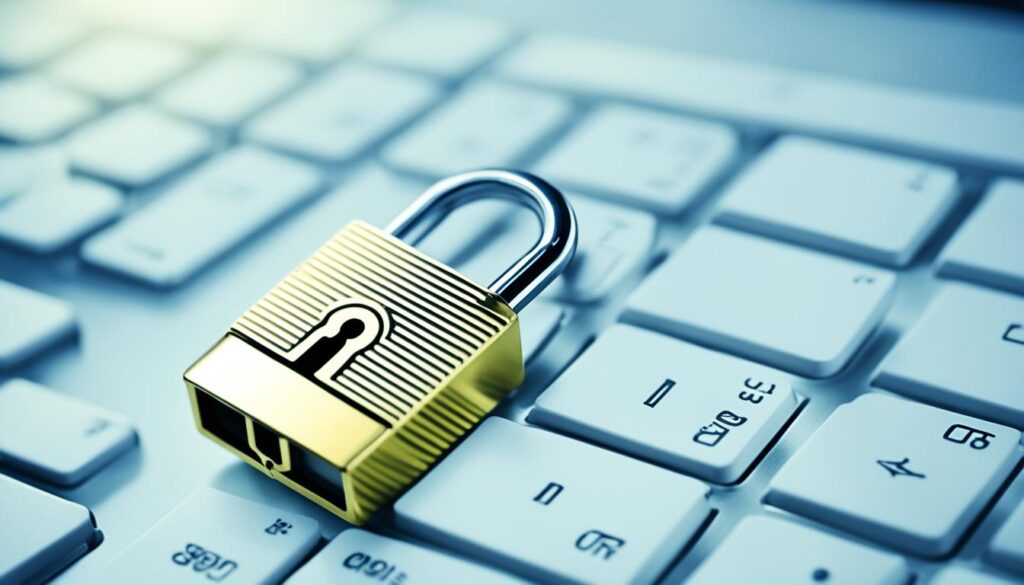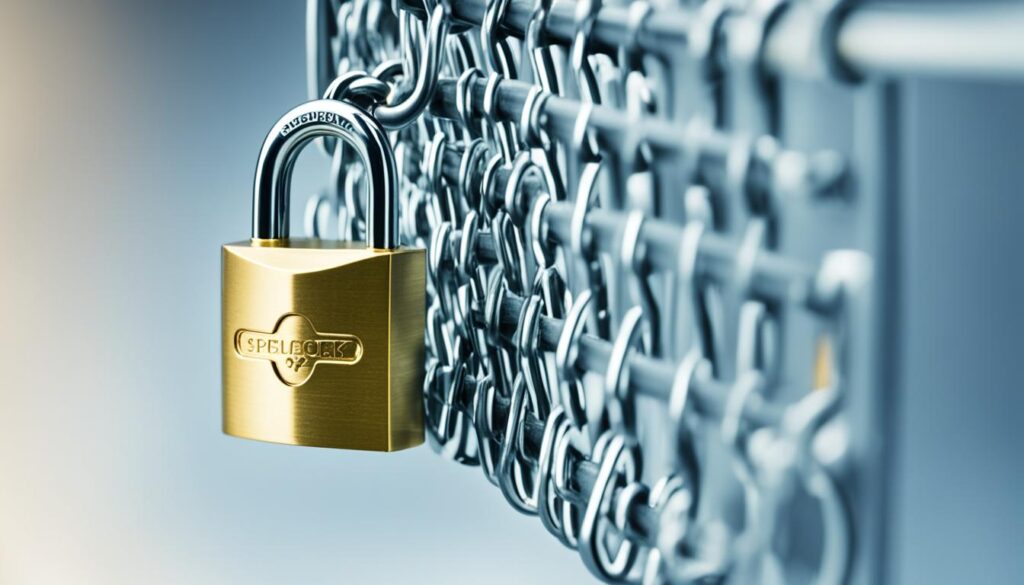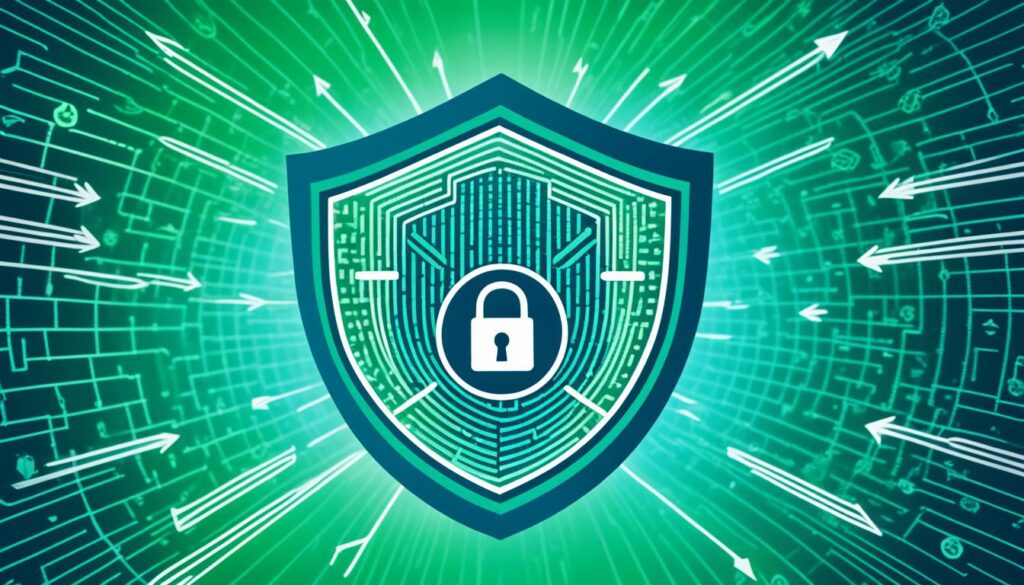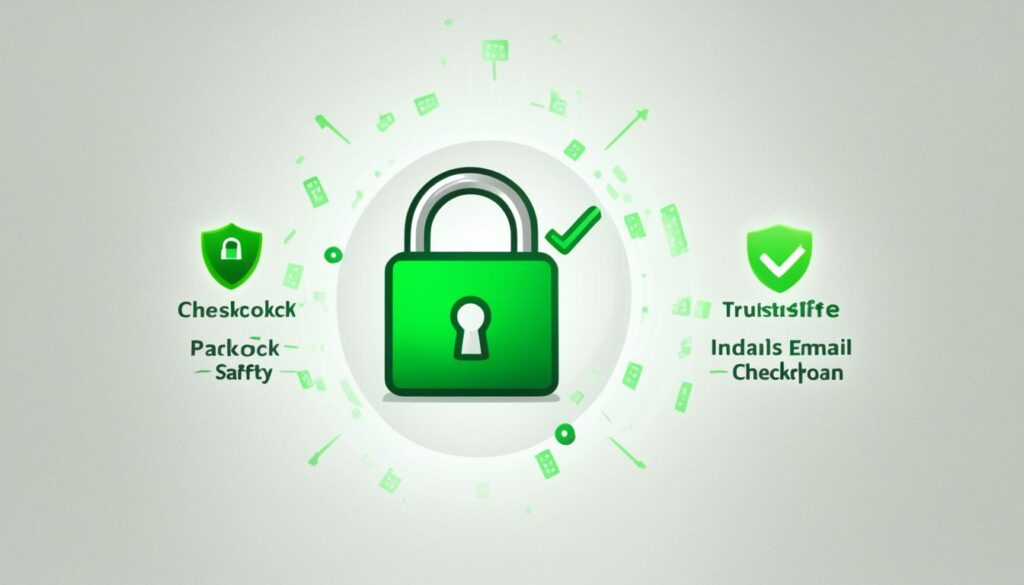Did you know online auction fraud costs victims millions yearly? As online bidding grows, scammers get smarter. It’s vital for buyers and sellers to stay alert and protect themselves.
We’ll share 10 key tips to prevent online auction fraud and secure your transactions. These strategies help protect your bids, stop bid manipulation, and keep you safe online. Let’s learn how to fight back against auction fraud.

Key Takeaways:
- Be cautious of wire transfers and escrow scams.
- Avoid deals that seem too good to be true.
- Read the fine print on payment processing sites.
- Remember that auction sites are not the sellers.
- Start small if you’re new to bidding.
Stay Away from Wire Transfers and Escrow Scams
When buying things through online auctions, be smart. Watch out for scams and protect yourself. Scammers often ask for money through wire transfers. But these transfers don’t protect you if something goes wrong.
Be careful with escrow services that say they work with sites like eBay or Amazon. Many of these services are fake. They trick buyers into thinking they’re safe. Always choose trusted payment methods in online auctions.
To avoid falling for wire transfer and escrow scams, remember these tips for online auctions:
- Use secure payment methods: Opt for payment methods that offer buyer protection, such as credit cards or platforms like PayPal which have strong fraud prevention measures in place.
- Be cautious of unconventional payment options: If a seller requests payment through unconventional methods like wire transfers, money orders, or cryptocurrency, it’s a red flag that should not be ignored.
- Verify the legitimacy of escrow services: If a seller suggests using an escrow service, research the service independently to ensure its legitimacy. Don’t rely solely on the seller’s claim of affiliation with reputable auction websites.
- Do thorough research on the seller: Before engaging in any transaction, take the time to research the seller’s reputation and read reviews from previous buyers. Look out for any negative feedback or suspicious activities.
Keep these tips in mind to stay safe. By being careful, you can avoid scams related to wire transfers and escrow services. This helps minimize the risk of auction fraud.
Be Cautious of Deals That Seem Too Good to Be True
When you find deals online, be careful. Scammers use low prices and rare items to trick buyers. Remember, if it seems too good to be true, it might be a scam.
If you see a deal that’s really cheap or super rare, think twice. It could be a fake auction. There are real sellers with good deals. But it’s key to spot signs of a scam.
Here are some **tips for avoiding fraudulent auctions** and **recognizing scams on auction sites**:
- Do your research: Check the item’s value before buying. Look at different websites to see if the price is fair.
- Check the seller’s reputation: Look at what other buyers say. Beware of sellers with bad reviews or scam history.
- Read the item description carefully: Avoid vague descriptions. Ensure the listing has clear info about the item’s condition and features.
- Verify the seller’s contact information: Make sure the seller has legit contact details. Talking to them can help you gauge their honesty.
- Be cautious of unusual payment methods: Stay away from risky payment ways like wire transfers or gift cards. Use safer options like PayPal or credit cards.
- Trust your instincts: If a deal feels wrong, listen to your gut. It’s better to miss out than to get scammed.

Stay sharp and watch for **signs of auction scams**. Being careful and doing your homework can keep you safe. Trusting your gut and being cautious helps ensure you don’t fall for fake deals.
Read the Fine Print on Payment Processing Sites
When shopping online, it’s key to know the rules of sites like PayPal or Google. These places give you protection for online purchases, but they have limits. Learn what these sites say to make sure your buys are safe and sound.
PayPal is a top choice for safe online shopping. It keeps your money safe and helps if there’s a scam. But you must know PayPal’s rules to use these perks. Always check their fine print to know your rights and what you must do.
Using Google Pay? Then, read their service terms. Google Pay fights fraud and keeps payments safe. Knowing the fine print on Google Pay helps you handle problems and find solutions when needed.
Informed buyers are empowered buyers. By paying attention to the fine print on payment processing sites, you can make confident and secure online purchases.
Payment sites protect you, but consider more safeguards. Paying with a credit card can add security for online purchases. Credit card firms offer fraud protection and can settle disputes, adding extra safety layers. Check your credit card’s rules to know all the protections they offer.
Pros and Cons of Payment Processing Sites
| Payment Processing Site | Pros | Cons |
|---|---|---|
| PayPal | – Buyer protection – Dispute resolution services – Secure payment infrastructure |
– Limitations outlined in terms and conditions – Seller disputes may require additional steps |
| Google Pay | – Fraud detection measures – Secure payment infrastructure |
– Specific terms and conditions apply – Buyer disputes may require additional steps |

Knowing the details of sites like PayPal and Google Pay, along with other payment options, keeps your online buying safe.
Understand that Auction Sites Are Not the Sellers
When using auction sites like eBay, know they connect buyers with third-party sellers. They provide a platform for listing items and bidding. But, they are not the ones selling the items.
Why does this matter? If something goes wrong, the auction site won’t give your money back. The seller is the one responsible for fixing issues.
eBay and similar sites do their best to ensure safe transactions. They have policies to protect buyers. Still, it’s up to you to check the sellers before buying.
Remember to read seller reviews and look at their ratings. Check their history of selling too. This tells you if they’re trustworthy. You should also talk to sellers directly on eBay to clear up any doubts.
Knowing that auction sites are just middlemen changes how you shop online. It means being careful and doing your homework for a better buying experience.
Start Small If You’re New to Bidding
If you’re new to online auctions, start with small items. This approach helps you get used to how bidding works. It also builds your confidence. Here is a simple guide for beginners on safe bidding:
- Research: Always research the item you want and its market value before bidding. It helps you bid wisely and avoid paying too much.
- Set a Budget: Decide the most you’re willing to pay and stick to it. Setting a budget prevents overspending during the excitement of an auction.
- Observe and Learn: Watch some auctions before you bid. It’s a good way to understand the process and learn strategies from experienced bidders.
- Read the Listing Carefully: Pay attention to the item’s condition, shipping costs, and any extra charges. Understanding the terms is vital.
- Ask Questions: If you’re unsure about something, ask the seller. Good communication ensures a smoother transaction.
- Know the Seller: Check the seller’s ratings and feedback from other buyers. It’s best to deal with reputable sellers.
- Bid Strategically: Plan your bids throughout the auction instead of waiting until the last minute. This method helps you understand your competition better.
Seek advice from friends who have experience with online auctions if you’re unsure. They can offer helpful tips for getting started.

By starting with small bids and practicing these tips, you can lessen the risks of online bidding. This way, you’ll become more confident and skilled in bidding.
| Bidding Strategies | Benefits |
|---|---|
| Sniping | – Can help avoid bidding wars – Keeps your bidding intentions hidden |
| Proxy Bidding | – Ensures you don’t miss out on an item – Automatically increases your bid to maintain the lead |
| Setting a Maximum Bid | – Allows you to set a limit and avoid overspending – Increases the chances of winning |
Avoid Completing Transactions Outside of Auction Sites
When shopping on online auction sites, staying safe is key. It’s important to avoid completing transactions outside of the auction site. This is a big warning sign about the trustworthiness of the seller and the safety of the deal.
eBay and other online auction places offer security features and protections for buyers. Doing a deal outside these platforms means you lose those protections. Scammers find it easier to cheat buyers this way.
Real sellers shouldn’t need to avoid the auction site for sales. Insist on keeping all sales within the auction platform. If a seller wants to deal through email, phone, or offline, it’s best to say no. This keeps you safe from scams.
Sticking to safe buying habits on the auction site lowers your risk of fraud. Keeping your security and peace of mind as top priorities is essential.

Advantages of Completing Transactions within Auction Site Platforms
| Advantage | Description |
|---|---|
| Buyer Protection | Most auction sites offer buyer protection policies to safeguard your purchases. |
| Secure Payment Options | Auction sites provide secure payment methods, allowing you to make transactions confidently. |
| Transaction Transparency | By conducting transactions within the auction site, you have access to detailed transaction records and communications. |
| Dispute Resolution | Auction sites often offer dispute resolution mechanisms to help resolve any conflicts or issues that arise during the transaction process. |
| Verified Seller Profiles | Auction sites provide verified seller profiles, allowing buyers to assess a seller’s credibility before making a purchase. |
Be Aware of Account Takeovers
Scammers often take over real seller accounts to trick buyers. They use fake auction listings or lie in messages. It’s very important to know the signs of these takeovers to keep yourself safe from scams.
Watch out for weird changes in what sellers list. Seeing sudden sales of many expensive items or a big switch in types of items might mean a scam. This could hint that someone else has taken over their account.
Knowing these signs is critical. Sites like eBay might not always protect you from these scams. Making sure you’re dealing with the real seller is key.
To avoid falling for fake auctions:
- Check your account often for any strange activity.
- Turn on two-factor authentication (2FA) for better security.
- Create strong and different passwords for your accounts to lessen hacking risks.
By being aware and taking steps to secure your account, you can avoid scams in online auctions.
Illustrative Example:
“I went through a tough time with a scam account takeover. The seller was well-rated and had good reviews, then began listing too many pricey items very cheaply. I got suspicious, reached out to customer support, and found out the account was hacked. It’s important to always verify a seller’s credibility to dodge scams like these.” – Lisa Matthews, seasoned online shopper

Verify the Seller’s Responsiveness for Expensive Items
Buying high-value items online needs careful steps for a safe deal. An important step is to check the seller’s response rate. By talking to the seller before bidding, you can see if they are trustworthy. This also helps start a clear conversation.
Talking with sellers lets you ask about the item’s state, realness, or more info. You can also try to get a better price. This way, you make sure you’re getting a good deal.
Starting a conversation helps you see if the seller replies quickly and well. A fast and useful reply shows they care about good service. This is key for high-cost buys.
Checking how responsive the seller is helps avoid fake sellers who don’t reply well. Getting to know the seller gives you confidence as you bid on pricey items.

| Steps to Verify Seller Responsiveness | Benefits |
|---|---|
| Initial contact through the auction platform messaging system | Ensures that all communication is documented and protected by the site’s policies |
| Ask specific questions about the item | Assess the seller’s knowledge and willingness to provide detailed information |
| Inquire about shipping methods and costs | Obtain accurate information regarding delivery options and potential expenses |
| Establish a timeline for responses | Set expectations and ensure timely communication throughout the transaction |
| Consider alternative sellers if unresponsive or evasive | Minimize the risk of dealing with unreliable or fraudulent sellers |
Ensure Consistent Email Addresses for eBay and PayPal Accounts
When you buy online on eBay, make sure the email for your PayPal is the same. This simple step helps keep you safe from fraud. It makes buying secure.
Scammers use inconsistent emails to trick others. They pretend to sell without real connection to eBay or PayPal. By matching emails, you avoid these scams.
Checking emails means you’re dealing with real sellers. It protects your money and stops fraud.
Using PayPal and eBay safely means matching your emails. This protects you from scams. It keeps your online shopping safe.

Always check that your eBay and PayPal emails match. It’s a simple step to prevent fraud.
Seek Assistance and Report Suspicious Activity
If you see something suspicious on an online auction site, act fast. Reporting scams to the site’s admins or the right authorities is key. This helps stop others from being scammed and keeps online auctions safe.
There are many ways to get help if you spot fraud. Auction sites often have special sections or support teams for this. You can also reach out to the Federal Trade Commission (FTC) or the Internet Crime Complaint Center (IC3) for guidance.
When you report fraud, you’re not just protecting yourself. You’re helping everyone in the online auction world. By sharing what you know, we all build a stronger defense against scams. Let’s work together to make online auctions safer for everyone.